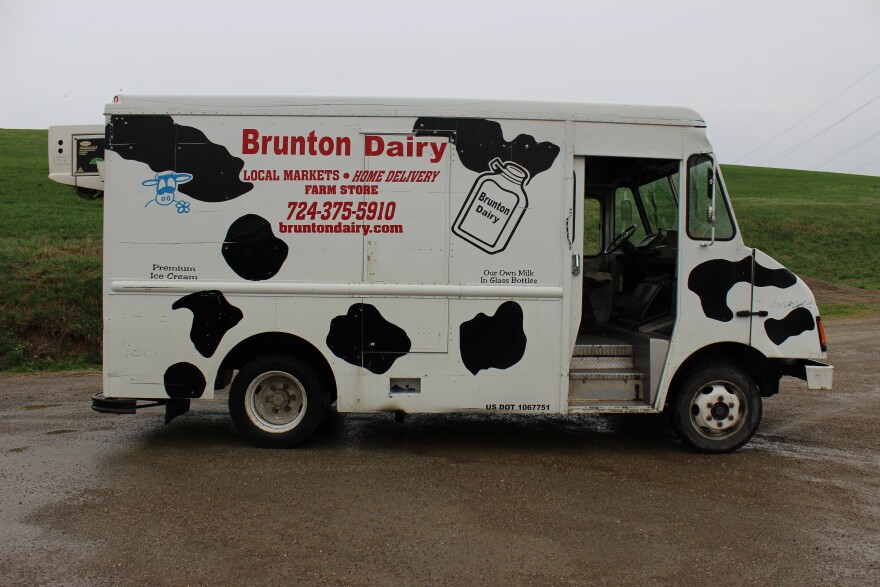Jim Brunton pulled his boxy delivery truck into the loading dock of his family’s milk plant after wrapping up his weekly door-to-door route, which starts around 4 a.m.

He sprays down his boots before going inside the sterile facility.
After the walk-in cooler is the bottle washing room, where used bottles get ready to be refilled.
Four thousand gallons of milk a week are bottled here. That includes some chocolate milk, and a little buttermilk for restaurants, too.
In the processing room, a series of metal tubes stretch across the ceiling connecting large silver vats.
Raw milk is pumped into a holding tank before going into the homogenizer.
“It smashes the cream into little pieces, so it doesn’t separate, basically,” Brunton said.

There’s also an ice cream machine, which is part of a venture started by the Bruntons 17 years ago. They make five different flavors.
“My dad started milking cows in 1946 or ‘47, right here on this farm,” said Jim’s uncle Ed Brunton, who also works on the dairy full time, along with two other family members. Some younger cousins help out when they’re not in school.
All 120 milking Holstein cows get milked twice a day, at 4 a.m. and 5 p.m. There are another 200 dry cows and baby calves.
Originally, the milk was sold to a nearby dairy, but at a low price, and Ed’s dad didn’t have total control over the herd so he did something unusual, and started bottling his own in the 1960s.
“But he first bottled milk in cardboard cartons, and then his motto became glass is a pain in the …,” Ed Brunton said with a laugh.
Eventually the dairy had to switch to glass to take advantage of the jugging business.
“He home delivered milk until about 1972, and then it was cheaper for people to come out here and buy milk as a jugger than it was to have it delivered,” said Brunton.
But an unexpected economic change left them vulnerable.
“Then in 1974, ‘75 when the gas crunch hit, that destroyed this business, the jugging business,” said Brunton. “[In] 1984, he went back into the home delivery business, then we started selling milk house to house, that was how we survived, then we slowly got involved in doing wholesale stuff.”
Now, about half of their business is selling wholesale to stores, and the other half is still home deliveries. Brunton says it’s always been a pretty tough business, but the dairy industry has really struggled in recent years.

“People don’t drink milk like they used to,” said Brunton.
In fact, Americans drink about half as much as they did in the 1970s. There are a lot of plant-based alternatives now and the Brunton’s aren’t fans.
“Soy milk is not milk,” said Jim Brunton. “Why do they call almond milk ‘almond milk’? Who would buy it if they called it nut juice?”
For dairy farmers, when necessities like diesel and corn go up, already tight margins can literally disappear. That’s lead to the closure of many small farms throughout the region. But farmers are better able to withstand those fluctuations when they own the bottling process. And because the Brunton’s already have the equipment, they only need to maintain it. That includes equipment like the $80,000 homogenizer.
While milk prices have been down, the Bruntons still get two to three times more revenue selling to Giant Eagle and individual homes, than they do selling their surplus milk to a big dairy. Ed said even though more cost and labor go into the bottling, it helps take care of the Brunton workforce.
“One hundred cows will support four or five families here, bottling your own milk,” he said.

He said if they only sold the milk to another bottler, they’d need three times that, about 300 cows.
“We pay our bills, and we’re able to buy equipment as we need it,” Ed Brunton said. “It’s really growing, it seems like you’re bottling more and more.”
Despite that growth, especially with whole milk, don’t look for a job at Brunton’s any time soon. Ed said they’re keeping it all in the family.







